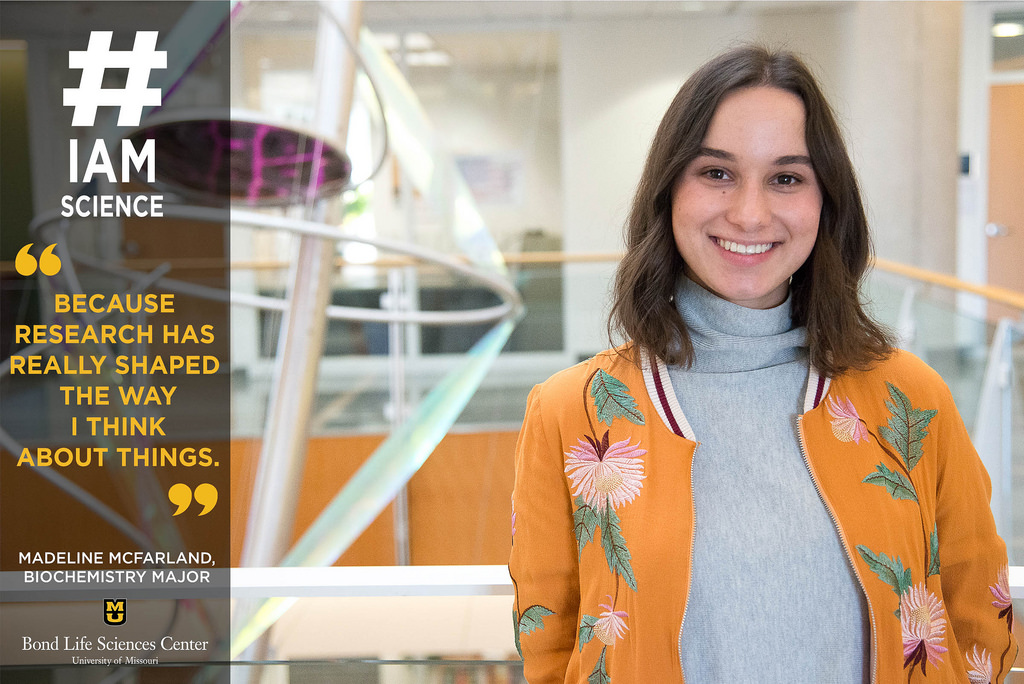Published on

Madeline McFarland, a senior biochemistry major, works in the Burke Lab in Bond LSC. | photo by Allison Scott, Bond LSC
Science isn’t limited to the lab. It’s more of a mindset than a discipline, and Madeline McFarland knows this all too well.
As a senior biochemistry major working in Donald Burke’s lab in Bond LSC, McFarland experiments with ribonucleic acid (RNA) to study the origin of life before DNA and protein served as genetic material and catalyst, respectively.
“I’m interested in the RNA World Hypothesis and how RNA may have played a role in getting life started on our planet,” McFarland said.
This hypothesis suggests early forms of life on Earth may have relied solely on RNA to store genetic information and to catalalyze, or spur, chemical reactions. The theory goes that DNA eventually evolved to take its place due to the instability and ineffectiveness of RNA.
In the lab, McFarland focuses on using a program called systematic evolution of ligands by exponential enrichment (SELEX), which filters the RNA so she can find which strands do what she’s looking for. Specifically, she’s trying to determine if the RNA can make a reaction happen. If McFarland can find this connection, scientists would see that as support for for the RNA World Hypothesis.
“I’m trying to see which RNAs can perform a catalytic function,” McFarland said. “By doing that, we can kind of start to think about how RNA used to function in early earth.”
Her typical day starts at 9 a.m. when she heads to Bond LSC to get her experiments set up for the day.
“I go to class while they’re incubating,” McFarland said. “My science allows me to set stuff up and have a break while it’s running. I’m usually running experiments four days a week.”
McFarland was inspired by the work being done in Bond LSC and the analytical way of thinking about experiments.
“[Research] is kind of nailed into you as soon as you step on campus,” McFarland said. “That was the motivating factor, but I came to love it for a lot of reasons. It’s really shaped the way I think about things.”
When she’s not wearing her lab coat and investigating the origins of life, McFarland spends her time working in environmental efforts at Mizzou.
“I’m really passionate about sustainability in all of its forms: environmental, economic and social,” McFarland said. “I lead the electronic waste drives around campus, and I’m co-directing sustainability week this year.”
McFarland is also a co-president of the biochemistry club.
“In our meetings, we bring in grad students and faculty to talk about career options, so everyone can ask questions,” McFarland said. “We also do fun events. Last night, we had a biochemistry-themed breakout room. They had to balance chemical equations and transcribe and translate a DNA sequence to spell out a word. We have a lot of fun with it.”
All of her work in the lab in combination with her research at Bond LSC has only strengthened her bid for her next endeavor: medical school.
“I’m passionate about communicating science, and I think medicine would allow me to do that,” McFarland said. “I like the idea of radiology because it allows you to look at an image, or data, then think through things on your own, which is a lot like research.”
If she doesn’t end up at medical school, McFarland would like to continue to pursue education. She could see herself attending graduate school.
“I’m interested in a master’s in public health,” McFarland said. “It would allow me to expand my knowledge of science and how it relates to health beyond the scope of the lab.”
Regardless of if she continues to learn through medical or graduate school, though, McFarland credits research for having an immense impact on her career.
“Research has really shaped the way I think about things,” McFarland said.